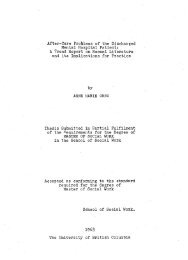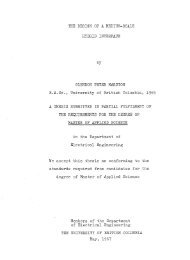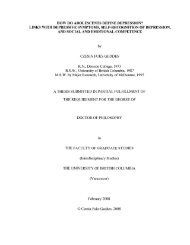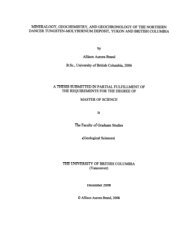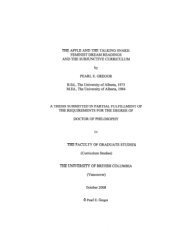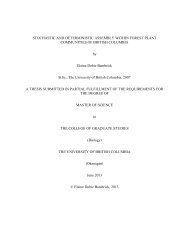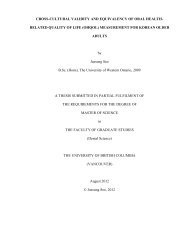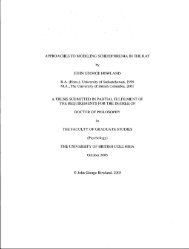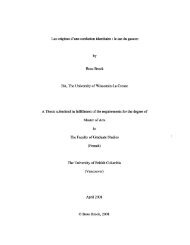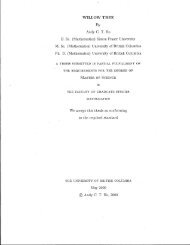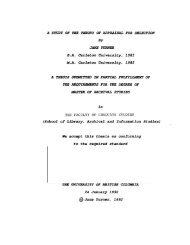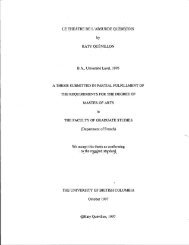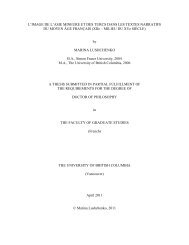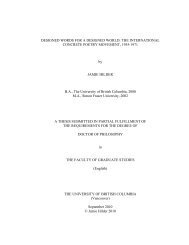The 1536 Dissolution of the Lesser Monasteries: Same Suppression ...
The 1536 Dissolution of the Lesser Monasteries: Same Suppression ...
The 1536 Dissolution of the Lesser Monasteries: Same Suppression ...
You also want an ePaper? Increase the reach of your titles
YUMPU automatically turns print PDFs into web optimized ePapers that Google loves.
Fur<strong>the</strong>rmore, <strong>the</strong>re is ano<strong>the</strong>r argument that states <strong>the</strong> series <strong>of</strong> religious events taking<br />
place at <strong>the</strong> time influenced <strong>the</strong> desire to end monasticism, which is why <strong>the</strong> visitations were<br />
implemented. Thompson writes ―it is easy to fasten on <strong>the</strong> mendacity <strong>of</strong> <strong>the</strong> dramatic – indeed<br />
over-dramatic – periods <strong>of</strong> <strong>the</strong> Act <strong>of</strong> <strong>1536</strong>, and to ignore <strong>the</strong> fact that it was framed by laymen<br />
and clergy inspired by new religious ideals.‖ 11 In o<strong>the</strong>r words, it was <strong>the</strong> new religious ideasfrom<br />
Germany, such as iconoclasm, infiltrating England that influenced <strong>the</strong> closures, ra<strong>the</strong>r than <strong>the</strong><br />
financial burdens <strong>of</strong> <strong>the</strong> Crown. This view implies <strong>the</strong>re was indeed a larger plan to close <strong>the</strong><br />
monasteries, not so much for financial needs as to remedy <strong>the</strong> problems between monasticism<br />
and <strong>the</strong> changing religious ideas. Reformist ideas from <strong>the</strong> Continent, such as Lu<strong>the</strong>ranism, did<br />
advocate against relics and pilgrimages as well as monasteries. From this it follows that <strong>the</strong><br />
general interest <strong>of</strong> <strong>the</strong> visitors was to find a means to ―legitimately‖ close <strong>the</strong> monasteries in<br />
order to move away from <strong>the</strong> ―pomp‖ <strong>of</strong> monastic orders.<br />
Whe<strong>the</strong>r or not <strong>the</strong> Valor was <strong>the</strong> first stage <strong>of</strong> <strong>the</strong> closures remains a question. If a<br />
specific monetary value was <strong>the</strong> target <strong>of</strong> <strong>the</strong> closures, and only <strong>the</strong> Valor clearly distinguished<br />
<strong>the</strong> wealth and resources <strong>of</strong> <strong>the</strong> religious houses, <strong>the</strong>n <strong>the</strong> visitations seem irrelevant. But <strong>of</strong><br />
course, <strong>the</strong> visitations may have been a means to justify <strong>the</strong> closures <strong>of</strong> lesser monasteries.<br />
Never<strong>the</strong>less, no set plan for <strong>the</strong> closure <strong>of</strong> all monasteries was evident with <strong>the</strong> implementation<br />
<strong>of</strong> <strong>the</strong> survey. As mentioned, a survey <strong>of</strong> church lands was necessary for taxation purposes. <strong>The</strong><br />
visitations, on <strong>the</strong> o<strong>the</strong>r hand, were specifically for investigating <strong>the</strong> condition <strong>of</strong> <strong>the</strong><br />
monasteries. <strong>The</strong> three main commissioners were <strong>the</strong> priest Robert Layton, and <strong>the</strong> lawyers John<br />
ap Rice and Thomas Legh. <strong>The</strong> interests <strong>of</strong> <strong>the</strong>se men, such as reforming religion, and personal<br />
gains, such as property, were closely tied to Cromwell‘s. Cromwell‘s intentions appeared to be in<br />
favour <strong>of</strong> closing monasteries because <strong>of</strong> <strong>the</strong> emphasis <strong>the</strong>y placed on ritual, richly decorated<br />
11 Thompson, ―<strong>Monasteries</strong>, Society, and Reform,‖ 195.<br />
23



